During the 8 to 12 hours before surgery, you may have been instructed not to eat or drink anything. Unless you have been told it is okay to take your medications with a few sips of water the morning of surgery, why can’t you eat or drink before surgery becomes an important question for most patients — but the rule is simple: no food or drink means no food or drink!
Fasting Before Surgery: Reasons, Complications, and Instructions
Patients are asked not to eat prior to their procedure for a number of reasons, including potential complications that could arise if food is inside the stomach during the administration of anesthesia. Why do you have to fast before surgery? Because any patient undergoing anesthesia should have an empty stomach to prevent nausea or the risk of food entering the lungs. Patients’ safety is the main purpose of creating rules about preoperative fasting.
Why should I fast before the surgery?
There are many different types of surgeries; some are done under local anesthesia, others require regional or general anesthesia. Normally, a patient is not allowed to eat or drink before the operation that is performed under general anesthesia. Why do you need to fast before surgery depends on the anesthesia type and the patient’s condition.
Under general anesthesia, the normal throat reflexes and the gastrointestinal tract movements are temporarily stopped.
If the patient’s stomach is full in this condition, there is a risk of vomiting or bringing food into the throat.
Consequently, food particles may easily make their way into the lungs or airways and cause suffocation or damage the respiratory system.
Even in local anesthesia, due to the possibility of intraoperative problems such as the patient waking up during the operation or not cooperating with the medical team, the patient might be placed under general anesthesia.
Therefore, all patients are normally asked to fast before the operation, regardless of what type of anesthesia is planned for them.
Reasons of fasting before surgery
How long do I have to fast before surgery?
The amount of time a patient is not allowed to eat before surgery varies according to age, individual condition, type of surgery, and food consumed. Many patients ask how long to fast before surgery, and in general, one should not eat for 8 to 12 hours and not drink for at least 2 hours before the operation. Unless the doctor permits taking medications with a small amount of water, even chewing gum is not allowed.
Normally, one should not eat for 8 to 12 hours and not drink for at least 2 hours before the operation.
Unless the patients have to take medication and the doctor permits them to consume a small amount of water. Even chewing gum is not allowed during the fasting period.
Of course, there are always exceptions. For example, patients with diabetes need to eat regularly to prevent hypoglycemia.
In these cases, you must inform your doctor about your condition so that he or she can tell you the necessary instructions to handle low blood sugar during the fasting period.
You should also tell your healthcare provider if you are taking certain medications.
You should not eat for 8 to 12 hours and not drink for at least 2 hours before the surgery.
How does prolonged fasting affect surgery?
Not eating or drinking excessively may cause other problems. If the fasting state is prolonged, in addition to mental problems and increased stress, there will be a risk of dehydration, which makes the operation more dangerous, especially for children.
Prolonged fasting in women may increase the risk of hypoglycemia.
In general, long-term fasting causes abnormalities in the body’s metabolism, so fasting longer than the prescribed time is not allowed.
An anesthesiologist is the best person to determine the exact duration of fasting in order to ensure that the patient’s health is not compromised.
What am I allowed to consume before surgery?
Try to eat healthy, high-fiber foods like fruit and vegetables several days or weeks before surgery.
In addition, foods rich in vitamins, minerals, and protein are essential for your body to go through the postoperative healing process as well as possible.
Moreover, having a low-fat diet minimizes the possibility of postoperative side effects.
Avoid processed foods, red meats, alcohol, and cigarettes at least 48 hours prior to your surgery.
It is necessary to avoid overeating or eating slow-digesting foods, such as legumes and vegetables, before your 8-to-12-hour fast; otherwise, fasting will not be useful. Alternatively, have a light meal like soup.
Try to eat healthy, high-fiber foods like fruit and vegetables, in addition to foods which are rich in vitamins, minerals, and protein several days or weeks before surgery.
You can also drink clear fluids (water, weak black tea, or black coffee NOT milk or dairy products) up to 2 hours before surgery.
Hydrating the body, preferably with water, will help you tolerate the operation significantly better. This is especially important in hot weather.
| Stop Solid Foods | Drink Clear Liquids Until | Arrival Time |
| 10 p.m. | 4 a.m. | 6 a.m. |
| Midnight | 6 a.m. | 8 a.m. |
| 2 a.m. | 8 a.m. | 10 a.m. |
| 4 a.m. | 10 a.m. | 12 p.m. |
| 6 a.m. | 12 p.m. | 2 p.m. |
What happens if I don’t fast properly?
A significant factor that worries anesthetists is not fasting before surgery.
The following risks may occur if you eat or drink before general anesthesia:
- Nausea and vomiting
- Aspiration (inhaling vomit)
- Pulmonary complications (infection, pneumonia)
- Asphyxiating or choking to death
When to stop eating before surgery?
To clarify when to stop eating before surgery, your anesthesiologist or surgeon will provide the exact timeline. Generally, stop eating solid foods 8–12 hours before surgery and clear liquids 2 hours before. Hydrating with water up to that point helps your body tolerate the operation better.
What if I had an emergency operation?
In case of an emergency operation, bowel preparation (bowel prep) is done, which is a process that drains the digestive tract of food and stool. It is also a way to make sure the bowels are completely empty in order to prepare the patient for surgery.
If you are having surgery in Iran, an anesthesiologist will inform you about the necessary instructions, such as the duration of the fasting period and what foods or liquids you can have as your last meal before surgery, to avoid possible complications.
Share this article:
Before & After Photos
Medical & Cosmetic Treatments
Click here to add your own text
Related Articles
Click here to add your own text


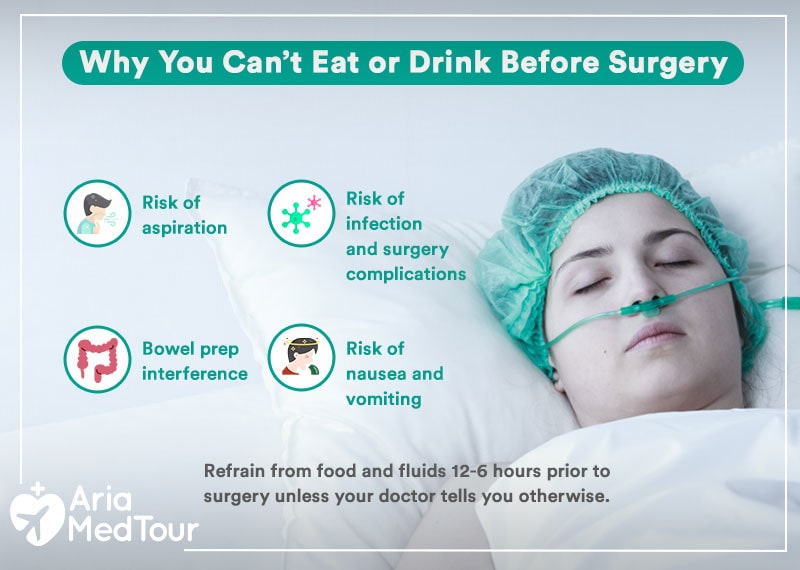
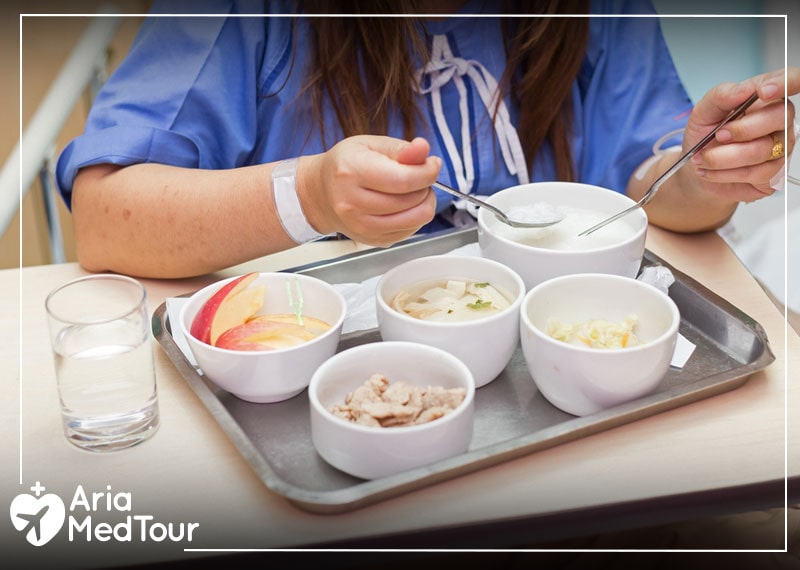




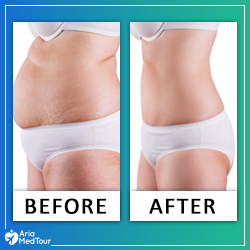
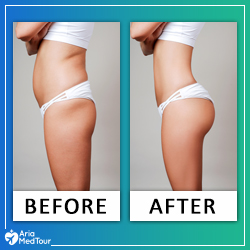
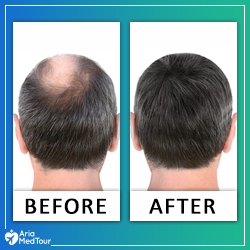









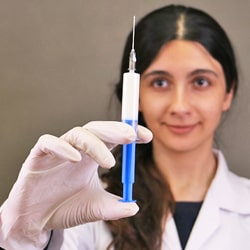





Hello, I accidentally had tea in the morning before my operation. What happens if someone accidentally ate before surgery? Should I still go to the hospital?
Hi Maria, it’s important to inform your doctor immediately if you accidentally ate before surgery. In most cases, the surgery might be postponed for safety reasons, since anesthesia increases the risk of aspiration when your stomach isn’t empty.
In our clinic, patients often ask why fasting before surgery is so critical. Could you share the most effective way to explain this to them?
Hi Olivia, you can explain that fasting before surgery keeps the stomach empty, reducing the risk of vomiting or aspiration during anesthesia. It also helps stabilize blood sugar levels and ensures smoother anesthesia recovery.
Hi Sarah, great question! The main reason why you can’t eat or drink before surgery is to prevent food or liquid from entering your lungs during anesthesia, which can cause complications. That’s why fasting before surgery is one of the most important preoperative instructions.
I’ve always wondered, why do you have to fast before surgery? It seems a bit strict not to eat or drink anything.
My father’s operation is scheduled for tomorrow morning. Could you please tell me when to stop eating before surgery and how long to fast before surgery for older patients?
Hi David, generally, doctors recommend 6–8 hours fasting before surgery for solid foods and 2–3 hours for clear fluids, but the exact duration depends on the type of surgery and your father’s health condition. Always follow the surgeon’s specific instructions.
Some of my patients ask why are you not allowed to eat before surgery but can sometimes have a light meal. Could you clarify what counts as examples of light breakfast before surgery?
Thank you, Dr. Andrews. Generally, no food before surgery means avoiding solid meals 6–8 hours before the procedure. However, in some cases, patients may have a light breakfast before surgery, such as plain toast or black coffee, if the doctor allows.
Many patients still ask why do you need to fast before surgery or why are you not supposed to eat before surgery, even though it’s mentioned in their instructions. How can we make this clearer in patient education materials?
Hi Emma, a good way is to emphasize safety: fasting before surgery helps prevent aspiration and ensures anesthesia works safely. Adding simple visuals or infographics showing the “empty stomach rule” can make it easier for patients to understand.
Your work has such a positive impact on everyone 🔥 who takes time to read
This is the best result for us Deeu! Thanks for your comment…
This post made me stop and think about gratitude in completely new ways
Thank you for your comment dear Deeu. We are glad that you are reading and sharing your opinion with us.
Love how you make complex ideas accessible to everyone here
Thank you for your comment Deeu…I got a lot of good energy from you!! it makes us happy that you read and use our post dear.
I really like reading through a post that can make men and women think. Also, thank you for allowing me to comment!
Thank you dear Marina for taking the time to read our content and sharing your comment with us. We are glad it was for you.
You’re so awesome! I don’t believe I have read a single thing like that before. So great to find someone with some original thoughts on this topic. Really.. thank you for starting this up. This website is something that is needed on the internet, someone with a little originality!
Thank you for your comment dear Cristofer and i have to say we are glad you used it and it was useful for you…
I wanted to take a moment to commend you on the outstanding quality of your blog. Your dedication to excellence is evident in every aspect of your writing. Truly impressive!
Thank you for your comment dear… We are glad that you are reading and sharing your opinion with us.
Just wish to say your article is as surprising The clearness in your post is just cool and i could assume youre an expert on this subject Fine with your permission allow me to grab your RSS feed to keep updated with forthcoming post Thanks a million and please keep up the enjoyable work
Thanks, dear. We are glad that you used our content and shared your opinion with us…
Your post clarified many misconceptions. I appreciate the clarity.
Thank you for your comment dear… We are glad that you are reading and sharing your opinion with us.
Great job! The conclusion tied everything together nicely.
Thank you for your comment dear,We are glad that you are reading…
Strong points and clear examples. Please write more on this topic.
Thank you for your comment dear… We are glad that you are reading and sharing your opinion with us.
I like your approach here. I use https://pdfpanel.com to manage my contracts and forms.
Great idea dear…thanks for sharing with us